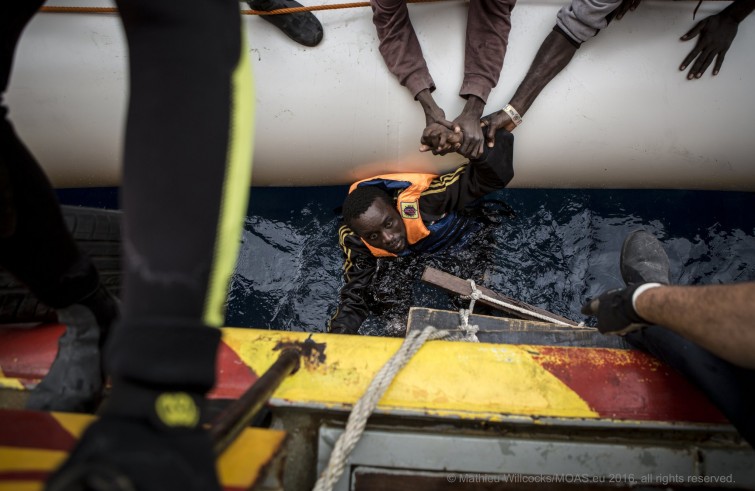
Europe is experiencing a “crisis of solidarity and political will” as regards migratory inflows, with Countries like Italy enduring the heaviest burden. The priority is just to send back migrants through repatriations, strengthening border controls at the southern borders of Libya to prevent inflows into Europe, while failing to consider the tragic situations these people are fleeing from and the risk of further human rights violations. Leïla Bodeux, Policy and advocacy officer on asylum and migration at Caritas Europe, is extremely critical of the European Commission’s Action Plan for central Mediterranean up for discussion today, July 6, at the informal summit in Tallinn. “Focusing only on security is counterproductive – she said – since it fuels smuggling and trafficking networks, forces people to embark on the more dangerous route and does not decrease illegal migration, to the contrary.”
What is the position of Caritas Europe vis a vis the European Commission’s Action Plan for Central Mediterranean?
We regret that most proposals are not new and we regret the clear focus on cooperation with Libya – failing to ensure the respect of human rights and principles – on border control and return. Under the recommendation related to the implementation of the Minniti law, the EC even recommends to extend detention periods.
The measures are intended to support Italy and reduce pressure in the Central Mediterranean area, but we don’t see a real solidarity by other States. France said they don’t want to receive boats in Marseille, while Austria threatened to deploy military troops at its border at the Brenner Pass …
We are witnessing a crisis of solidarity and political will
due to a negative political narrative on migration that unfortunately dominates many counties. Migration is wrongly seen as a threat or a problem rather than as an opportunity.

Commission proposals include sending over 500 repatriation experts at Italy’s request, to strengthen controls at borders in Africa and increase hotspots. Is Europe’s priority only the return of economic migrants?
Indeed it is. Border control and repatriations is EC and Member States’ priority unfortunately.
Several measures focus on these issues. For example, the Board of the EU Trust Fund should adopt by the end of July the project on sea and land border management in Libya drawn up by Italy jointly with the Commission, amounting to EUR 46 million; the EU and Member States should work with Libya to significantly and rapidly strengthen border controls at the external borders of Libya (particularly the southern ones) to stem further flows into Libya. This includes enhanced cooperation with G5 Sahel countries and the establishment, with EU financial support of EUR 50 million, of the “Joint Force” decided at the last G5 Summit, which aims at reinstating control at borders in the transit areas of Mali, Burkina Faso and Niger.
We clearly see a desire to stop the arrival of migrants in Libya
by strengthening controls at the Southern border. This approach disregards the reasons why people are forced to flee (namely, War, conflict, natural disasters) and aims at keeping people where they are. In our view,
focusing only on security is counterproductive since it fuels smuggling and trafficking networks,
and it forces people to embark on more dangerous routes
It does not decrease irregular migration, to the contrary.
The Commission’s proposals include the request to Italy to draft a Code of Conduct for NGOs carrying out search and rescue activities in the Mediterranean: after several months of criminalization of NGOs, what do you think is real aim behind all of this? Italy will draw up the requested Code of Conduct in consultation with the European Commission and Frontex, which should be directed at all actors involved in search and rescue operations at sea and not only at NGOs. The objective should be to improve coordination and saving lives instead of demonizing and criminalizing NGOs.
We hope that NGOs won’t be forbidden to disembark in Italy. Civil society should be consulted while writing this Code of conduct.
We regret that a toxic and dangerous negative political debate on NGOs is happening in Italy and other countries. NGOs should be praised for the work they do and the lives they save instead of being accused of collusion with traffickers.

What about the measures regarding Libya? The political situation in Libya is very chaotic and fragmented. A wide range of reports have documented numerous abuses towards migrants (rape, torture, forced labour), even in State controlled detention centres. Libyan authorities, supposed to fight against trafficking and smuggling, have been accused of participating themselves in trafficking activities. There are several types of Libyan coast guards attached to different ministries and authorities and several cases showed that some of them used violence against NGOs and migrants during rescue operations. Under such circumstances ,
strengthening cooperation with Libya without closely monitoring their activities risks leading to human rights violations.
EU policy makers should stop trying to externalize asylum and migration policies to Libya.










